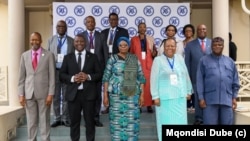At an extraordinary SADC Troika summit, the 16-member group chastised efforts by US lawmakers to 'punish' African countries who try to help Russia bypass sanctions and restrictions imposed over its invasion of Ukraine.
“Summit adopted the draft African Union Declaration on the USA proposed ‘Countering Malign Russian Activities in Africa Act’ and urged Member States to communicate SADC’s position, and reaffirmed the stance of non-Alignment on conflicts outside the continent and the region at multilateral fora,” it said in a communique.
The law, passed the U.S. House of Representative in April last year, is intended to “monitor and report on Russian political influence, disinformation operations and the activities of Russian, Russia-connected, or Russian-funded private military contractors in Africa.”
The Summit was attended by presidents of Namibia, Zambia, South Africa and DRC. Lesotho, Eswatini and Mozambique were represented by other officials.
Liesl Louw-Vaudran, the International Crisis Group's AU senior advisor told VOA that the wording risks “souring diplomatic relations” with at least “certain African countries.”
“The foreign minister of South Africa (Naledi Pandor) and other SADC countries have now condemned it (referring to the US Act) very strongly,” she pointed out as examples.
During a visit by US Secretary of State Antony Blinken, some nations told him they don't want to be bullied by the US to support Washington and Brussels in the Ukraine war situation.
Marisa Lourenço, a Johannesburg-based political and economic risk analyst told VOA that SADC's position is not an “anti-US” rhetoric, but that the group wants to “dictate their own futures.”
“African countries don't just have to align themselves with the US, Russia or China in order to have geopolitical influence,” she said.
“They can work with a variety of actors, and I think what they're trying to say is that they're going to oppose those kinds of Acts because they want to dictate their own future and that we are in a truly multipolar world now, not a bipolar one," Lourenço added.
The Trioka Summit also called for a dialogue aimed at “effectively coordinating'' forces by member states in the Democratic Republic of Congo to help bring lasting peace in the mineral rich Central African nation whose leader President Felix Tshisekedi chairs SADC.
The ICG's Louw-Vaudran said the call is timely in a conflict that has seen various players trying to bring peace to the region calling it “critical.”
“Now, there are troops from SADC that are part of MONUSCO (The United Nations Organization Stabilization Mission in the DRC), troops from South Africa, Tanzania and Malawi as well as the Eastern African force in the DRC - Burundians, Ugandans, South Sudanese,” she said.
“And so, as you can imagine, it's a rather chaotic sort of troop deployment in a very valuable and important part of the continent because it's one of the most resource-rich areas on the continent, and it's always been prone to conflict and armed groups.”
Analyst Lourenço “thinks the tension between the DRC and Rwanda does have the potential to escalate, however, I don't think that SADC has as much influence over it as an individual SADC member states like Angola does.”
“João Lourenço (Angolan president) has been involved in mediations and I think his mediatory role will have much impact than SADC's peacekeeping missions.”
The analysts also urged SADC to go beyond calling for an urgent national dialogue in Eswatini to make the goal of activists who staged pro-democracy protests in 2021 a reality.




